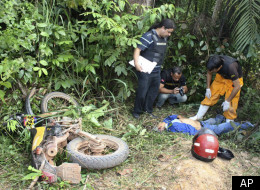Former Nazi Prison Guard, 90, Found Living in Britain
By Polly Johnson
Senior Desk Officer, Europe
FAREHAM, United Kingdom – A former prison guard at the Nazi-run Trawniki camp in southeast Poland, where thousands of Jews were murdered, was discovered this week living in a retirement community in Fareham.
Alexander Huryn, 90, is from Ukraine but has lived in the UK since 1948. Documents recently obtained by Holocaust researcher Dr. Stephen Ankier revealed that Huryn served as a guard at the concentration camp in 1944 and 1945.
Huryn has vehemently denied accusations of his participation in the Holocaust. “I absolutely never saw anyone get killed at the camp and I never killed anyone,” he told the Daily Echo, a British paper. Rather, Huryn said, the Nazi regime forced him into service, but his primary responsibility was to groom horses for Nazi officers.
His family sheltered Jews during World War II, according to Huryn. When the Nazi regime recruited him, he and his family feared they would lose their farm if Huryn did not comply. “I was sent because I was the eldest child. I had no choice. The Nazis took me away on a truck. I was very scared, I had no idea where I was going and definitely did not want to be there.” Huryn was 23 at the time.
“I don’t like what the Nazis did. I feel bad about what happened at Trawniki. It was terrible – but I had nothing to do with it.”
Huryn went as far to say that he had no idea what was happening inside the camps and only learned of the atrocities being committed after the war. Speaking to reporters at his home on June 13, Huryn said, “We were never given a rank, we were just soldiers. We were given a pre-historic gun, like an American Civil War rifle, and just five bullets.”
“I was asked to train horses for the German officers, even though I had no idea what to do. You didn’t dare argue. You just did whatever you were told. The German guards were not nice to me and I did not socialize with them. I never met Hitler or any other senior Nazis.”
Huryn and his wife now live in a bungalow in Fareham, where Huryn still earns a German Army pension of ten pounds a month. Their daughter, Sophie, who also lives in Fareham, said that her father “never really talked about it, but [ ] has always insisted that his family would have been shot. There were all sorts of victims of Adolf Hitler in all sorts of different ways.”
For more information, please see:
Daily Mail – Nazi concentration camp guard, living in Hampshire: “I was told to take the job, or die” – 14 June 2011
Daily Mirror – Hampshire OAP Alexander Huryn defends his past as a Nazi concentration camp guard – 14 June 2011
News From Poland – British pensioner revealed as former Nazi camp guard – 14 June 2011
This is Hampshire – Alexander Huryn tells Daily Echo: ‘I’ve done nothing wrong’ – 13 June 2011
Human Rights Watch Briefing Paper: Course Correction: Recommendations to the ICC Prosecutor for a More Effective Approach to “Situations under Analysis”
Environmentalists Murdered in Brazil
By Emilee Gaebler
Impunity Watch Reporter, South America
RIO DE JANEIRO, Brazil – Three environmentalists were murdered in Brazil in the last few weeks. On May 24, 2011, José Cláudio Ribeiro da Silva and Maria do Espírito Santo da Silva, a husband and wife team, were shot and killed in the state of Pará. The two were leaders of the National Council of Extractive Workers (CNS) which advocates for sustainable uses of the rainforest and protests illegal logging and deforestation.

Just days later, on May 27, 2011, Adelino Ramos was gunned down in the state of Rondônia. Ramos was the leader of the Movimento Camponês de Corumbiara (Corumbiara Peasant Movement), which advocates for sustainable land reform.
The assassinations came right as proposed modifications were being debated for Brazil’s Forest Code. The Forest Code, a 1965 law, lays out stipulations for Brazilian landowners to maintain a certain percentage of native forest on their lands as a legally protected reserve. The majority of landowners do not adhere to these stipulations.
The proposed changes to the Forest Code would grant amnesty to landowners who illegally deforested parts of their land, up until July of 2008. It would also reduce the size of legal reserves that must be maintained. In a very controversial decision, the Congress approved the changes, sending the modified bill on to the Senate who will now debate the issue.
The authorities in Brazil deny any link between the killings and the changes to the Forest Code. Afonso Florence, the Minister of Agricultural Development, maintains that “[t]he debate has another dynamic. There is no direct association”.
Despite this, the authorities have said that they will make environmentalist protection a priority. An emergency meeting of the President’s cabinet produced the promises that those who receive death threats will receive state government protection as well as national armed guard protection, if necessary.
Other environmentalist group leaders are not convinced that these promises will make any difference. As Leila Salazar-López; the Program Director for the group Amazon Watch, stated, “[t]here are over 200 unsolved murders in the Pará state alone involving Amazon activists”. In the past 25 years, there have been 1,580 reported murders of activists in Brazil. This resulted in only 91 trials and a mere 21 convictions.
All three of the murdered activists were victims of harassment and received death threats in the days prior to their killings. Police reports show that nothing was removed from any of the bodies and José Silva’s ear was cut off.
For more information, please see;
Latin America Press – Moves Toward Deforestation – 2 June 2011
UPI – Brazil Acts to Protect Amazon Activists – 1 June 2011
The Rio Times – Killing of Amazon Activists Sparks Protection – 31 May 2011
Act for Climate Justice – Brazil: Environmentalists Murdered in the Amazon and Debate Over a New Forest Code: Impunity Must End – 28 May 2011
Huffington Post Green – Adelino Ramos Killed: Third Environmentalist Activist Murdered This Week in Brazil – 28 May 2011
MORE THAN 300,000 PEOPLE STILL DISPLACED IN IVORY COAST
By Tamara Alfred
Impunity Watch Reporter, Africa
ABIJAN, Ivory Coast – On Tuesday, the United Nations (UN) refugee agency reported that more than 300,000 people are still displaced from their homes as a result of ongoing violence two months after the political crisis that arose after the disputed November elections was solved.

The UN reported that most of the displaced are living in camps or with host families in the western part of the country. Many of the displaced people were either victims of violence or witnessed other being slashed, burned or killed, according to Xavier Simon, the head of the Ivory Coast Doctors Without Borders.
“People tell us they can’t eat or sleep properly and that they suffer from anxiety and heart palpitations,” said Simon. “Terrified of further violence or revenge attacks, many choose to remain in hiding or as refugees.”
According to Doctors Without Border, displaced people are at further risk because they are in areas with food shortages and threats of disease, all heightened by the rainy season.
At the height of the crisis, approximately 1 million people were displaced and hundreds killed. The violence began when Laurent Gbagbo refused to cede power to the newly-elected president, Alassane Ouattara. Both parties have been accused of atrocities in the violence.
“Many of the dead are buried in mass graves,” said Melissa Fleming, the U.N. refugee agency spokeswoman. “Over 500 houses and a pharmacy were destroyed in five villages. As estimated 17,000 people are displaced in that region, including an unknown number reportedly still hiding in the forest.”
On Wednesday, the head of the Human Rights Division of the UN Mission in Ivory Coast called for immediate and impartial investigations into reports of attacks by the armed forces. On Thursday, the Ivorian government responded by announcing that it had formed a commission to investigate the crimes.
President Ouattara has repeatedly promised no mercy for human rights abusers regardless of their political party. However, on Wednesday, Human Rights Watch released a statement saying that no one from Ouattara’s camp had yet to be arrested. Those currently under investigation are all former officials of the government of Laurent Gbagbo.
UN High Commissioner for Human Rights Navi Pillay said in a statement, “We need concerted action designed to break the cycle of impunity, bring perpetrators to justice and rehabilitate victims in their rights and dignity.”
More than 100,000 Ivorians are estimated to have sought refuge in Liberia.
For more information, please see:
Reuters AlertNet – Ivory Coast: Fear persists even after violence subsides – 17 June 2011
CNN – Ivory Coast announces commission to investigate post-election crimes – 16 June 2011
CNN – 300,000 still displaced in Ivory Coast – 14 June 2011